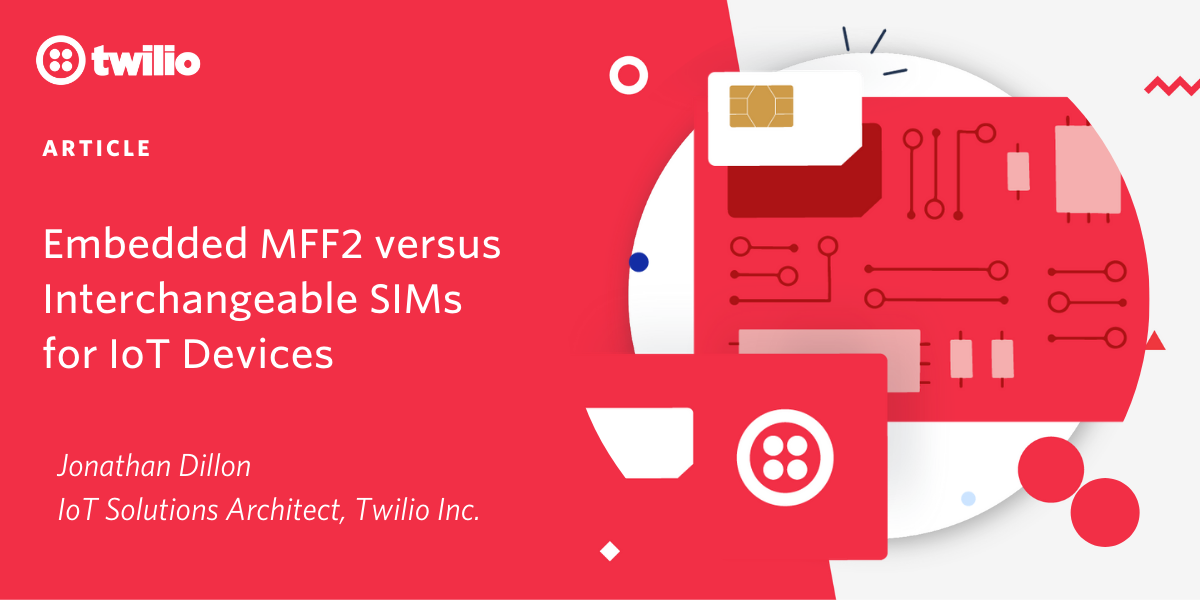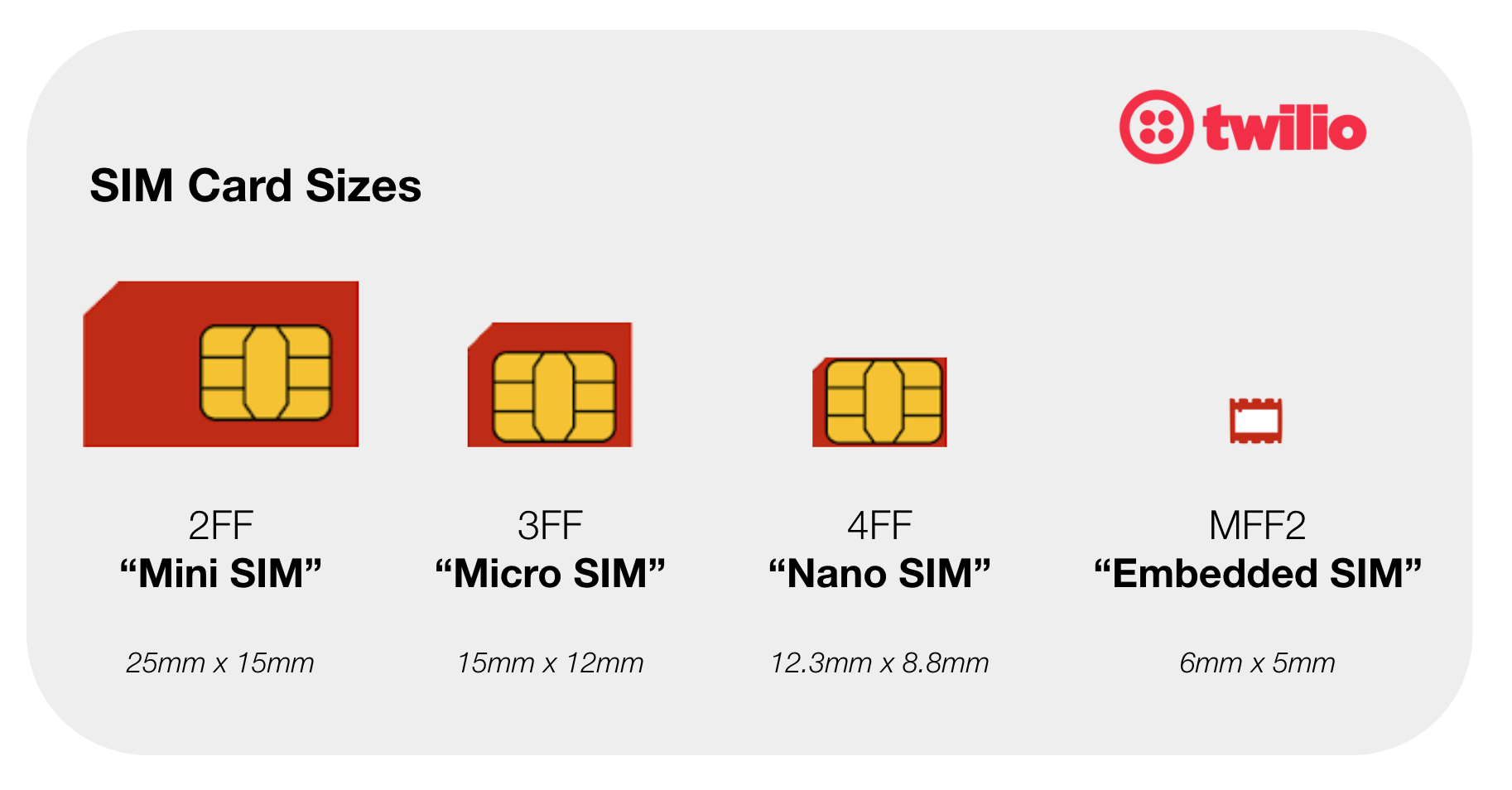Considerations for Choosing Embedded MFF2 over Interchangeable SIMs for IoT Devices
Time to read: 4 minutes

Most of us are familiar with traditional SIM card types, from mini to micro to nano SIMs. These are common in cellular connected hardware. For many types of IoT devices, however, these SIM form factors are impractical. In this article, we will provide guidance on choosing the right SIM form factor; we will specifically examine the advantages of solderable SIMs, also known as embedded SIMs, which are directly mounted on the circuit board (PCB) and cannot be easily removed, like traditional cards. The most common form factor for embedded SIMs is MFF2, a 6x5mm microchip soldered onto your circuit board. We’ll be focusing mainly on these MFF2 SIMs.
Advantages of soldered-down SIM chips
When designing your own connected device, or having a product built especially for you, there is the option to order a SIMs internal electronic brain packaged as a microchip to be soldered onto your circuit board.
Here are the primary advantages of using an MFF2 SIMs over exchangeable SIM cards in IoT devices:
Smaller size
One of the key reasons to opt for embedded SIMs is their exceptionally small footprint which can be valuable in wearables. At just 6x5mm, an MFF2 SIM is physically smaller than even a nano SIM and its required socket/holder. SIM manufacturers continue to innovate and are introducing even smaller embedded SIM form factors such as Wafer-Level Chip-Scale Packages (WLCSP or CSP), where the part is the size of the semiconductor die used inside all other SIMs and less than 25% the area of a MFF2 . For products with industrial design, or physical size constraints, an MFF2 SIM is easy to use and can free up additional space on circuit boards.

Cost reduction
Sockets and connectors can be expensive, and many IoT devices need to keep their Bill of Material (BOM) low to make economic sense. A SIM socket may have multiple molded pieces, metal stampings and plating. Engineers should compare the cost of an MFF2 SIM against the combined cost of a plastic SIM card and socket.
Rugged construction for devices deployed in rough environments
Correctly formed solder joints are incredibly robust and provide solid mechanical attachment of the SIM to the circuit board. SIM card sockets use spring-loaded contacts that press against the electrical contacts of the plastic SIM to provide an electrical connection. Drop it, or expose it to a high vibration environment like a vehicle, and the contacts can bounce off the card and temporarily lose electrical connection. If this happens while the modem is trying to communicate with the card, it will cause communication errors. An MFF2 SIM has no contacts to bounce or oxidize that can lead to diminished conductivity.
Devices deployed in wet environments
The preference in wet environments is to use an enclosure/case to keep the water out, but that is not always possible. As an alternative, you can apply a waterproof insulated coating to the circuit board to prevent moisture causing short circuits. However, during application, it is critical to restrict this coating from sockets and connectors, requiring careful application, masking or barriers. A circuit board with an MFF2 SIM can easily be conformally coated without damaging the SIM.
Coatings are inefficient in a production environment, adding drying times to cycle times, and adding equipment cleaning steps to line shutdowns and stoppages. They introduce hazardous chemicals into the production facility and employees must be protected from exposure. The addition of conformal coating makes repair of products difficult to impossible. Using conformal coatings should be a last resort.
Devices deployed in hot environments
While there are higher-temperature plastic SIMs the most common forms will simply melt at elevated temperatures. MFF2 SIMs are rated for higher temperatures than plastic SIM cards (up to 105° C). High temperatures are typically found in unvented electronics in warm environments such as solar installations.
Better security
A SIM card in a socket is easily removed once exposed, and can be used in an unauthorized device. A soldered down MFF2 SIM is far more difficult to remove without soldering equipment, and not as easily used with a smartphone or tablet. Circuit boards with soldered MFF2 SIMs can be designed to provide limited opportunities to intercept and potentially modify SIM-to-modem communications. A skilled hacker can still disassemble the circuit board, but the common intercept and modification hardware – hardware to sit between a SIM and device that modifies the communications, for tampering – is designed for use with nano SIM cards, not MFF2 SIMs.
Fewer assembly steps
During manufacturing, the labor intensive SIM card installation step is replaced by loading another reel of chips to the pick-and-place robot which places the electronic components on the circuit board. Pick-and-place machines, also known as chip shooters, can place thousands of components per hour and the additional time for one more chip is negligible. Furthermore, an MFF2 SIM is easier for a machine to handle than a SIM socket, making for faster, higher-yield assembly even before adding in the savings from reduced labor costs.
How to overcome the disadvantages of MFF2 SIMs
The main disadvantage of MFF2 SIMs is that they require more advance planning to install or remove than their swappable counterparts, as they are physically soldered to the circuit board. As a result, the cellular connectivity provider needs to be selected at the time of manufacturing, when all the components are simultaneously soldered to the PCB in the oven.
Twilio IoT can help you overcome these concerns: Twilio Super SIM provides a future-proof solution to cellular connectivity, available in various form factors, including MFF2. Furthermore, our IoT Accelerator services provide guidance in the form of hardware design reviews, architectural reviews, and much more.
Interested in trying Super SIM? Get your free trial SIM now!
Related Posts
Related Resources
Twilio Docs
From APIs to SDKs to sample apps
API reference documentation, SDKs, helper libraries, quickstarts, and tutorials for your language and platform.
Resource Center
The latest ebooks, industry reports, and webinars
Learn from customer engagement experts to improve your own communication.
Ahoy
Twilio's developer community hub
Best practices, code samples, and inspiration to build communications and digital engagement experiences.


